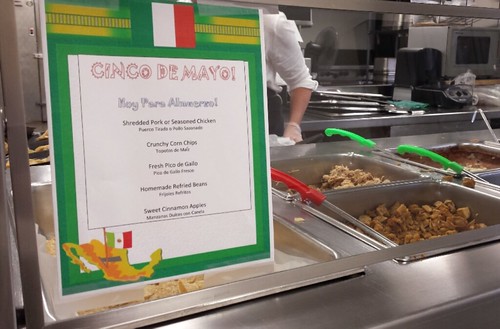
Through the Team Nutrition initiative, USDA provides grants to state agencies to expand and enhance their training and educational activities to help schools provide appealing and nutritious meals, nutrition education and healthier school environments. These efforts are designed to help children get the nutrition they need to learn, grow and be healthy. In addition to grants, Team Nutrition provides free nutrition education materials to schools, child care settings and summer meal sites that participate in the Child Nutrition programs.
By Samantha Therrien, graduate student, Framingham State University Food and Nutrition Program & Karen McGrail, MEd, RDN, LDN, Director, the John C. Stalker Institute of Food and Nutrition at Framingham State University
It’s that time again! As students head back to school many school nutrition programs across Massachusetts are continuing to use Smarter Lunchrooms strategies gained through their participation in a USDA Team Nutrition grant. The research-based Smarter Lunchrooms Movement, established at the Cornell Center for Behavioral Economics in Child Nutrition Program, focuses on creating sustainable lunchrooms that make the healthy choice, the easy choice for students. The Movement is based on the idea that even small, low-cost changes can make a big difference, and Massachusetts schools are benefitting from this first-hand.
As part of the USDA Team Nutrition grant, 51 schools across the Commonwealth received technical assistance and professional development delivered by a cadre of three Smarter Lunchrooms coaches. Here is how it worked: The coach completed the Smarter Lunchrooms Scorecard and snapped photos of the cafeteria during lunchtime to establish a baseline. The visit included a brief training session which served not only to educate staff, but to create Smarter Lunchrooms buy-in and garner enthusiasm. Before wrapping up the three-hour visit, the Smarter Lunchrooms coaches assisted the director and/or manager to set an action plan with specific goals, objectives and a practical implementation strategy.
After the visit, ongoing communication between the coach and the school served to provide welcomed technical support and resources. At a return visit later in the school year, the Smarter Lunchrooms scorecard and photos were repeated and the results of the plan assessed. Results were favorable…on average Smarter Lunchrooms scores increased by 30 percent, fruit sales increased by 9 percent and vegetable sales increased by 51 percent.
Take a look at a couple of the low-cost Smarter Lunchroom strategies implemented by schools in Massachusetts.
Massachusetts will sustain the Smarter Lunchrooms Movement this school year based upon the project developed with the USDA Team Nutrition grant.

